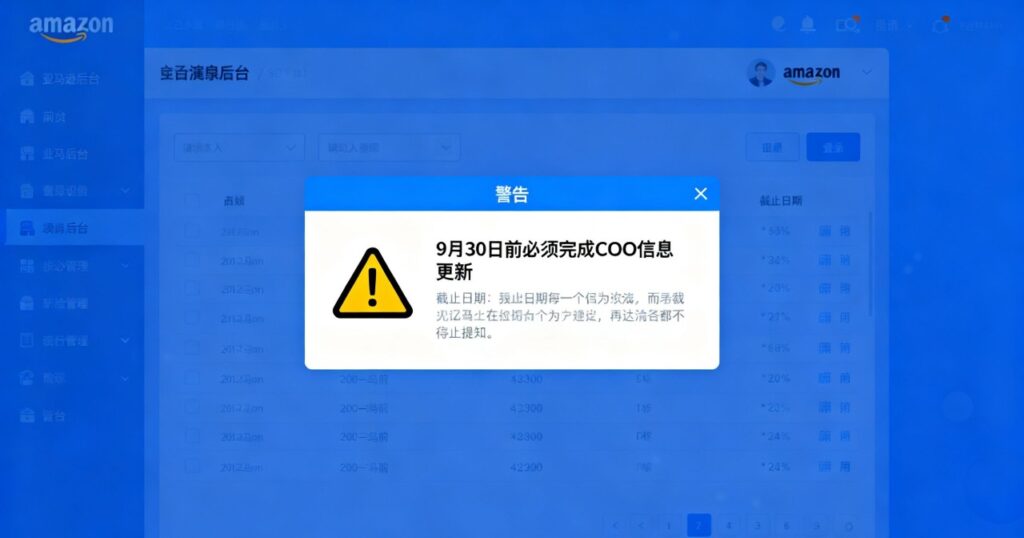With Amazon U.S. enforcing mandatory updates to product "Country of Origin (COO)" information, cross-border sellers are facing unprecedented compliance pressure and logistical challenges. In September 2025, Amazon announced that products failing to complete COO data supplementation within the specified timeframe will be marked as "non-compliant," potentially leading to delisting, sales restrictions, or even account suspension—directly impacting Q4 sales performance. The new policy requires precise labeling at the SKU level of the country where the product underwent its "last substantial transformation," encourages consistency with customs declaration documents, and mandates independent management for EU, UK, and U.S. marketplaces, requiring sellers to submit and synchronize data separately across all three regions. COO determination follows the principle of "last substantial processing location": for example, if chips originate from China but final assembly occurs in Malaysia, the COO must be declared as "Malaysia"; for products manufactured entirely within a single country, that country should be listed directly. Compliance risks act like time bombs—once the deadline passes, the system will remove the banner notification within 10 days while tagging the product as non-compliant and initiating cumulative penalties.
Country of origin information is deeply integrated with international logistics. Many international carriers have added HS codes and COO attributes to their shipping requirements; mismatches may result in customs clearance delays. To help sellers respond efficiently, LnRu (lnru.com) has launched an all-in-one COO verification and bulk update tool, supporting multi-marketplace synchronization and intelligent error correction, compatible with both FBA and third-party fulfillment (FBM) scenarios, enabling sellers to achieve full SKU compliance ahead of peak season.
Operationally, compliance can be rapidly implemented through the following steps: First, download the categorized product report and complete the bulk upload template by filling in fields such as “feed_product_type,” “item_sku,” “update_delete=PartialUpdate,” and “country_of_origin.” Chinese sellers must enter the full name “China” and are strictly prohibited from using the abbreviation “CN.” After submission, the system typically completes review within 10 business days. High-turnover SKUs should be prioritized to avoid stockouts during peak season. Compared to manually updating 100 SKUs—which takes approximately two hours—using the LnRu tool reduces this to 30 minutes, cutting data entry errors by 80%. The platform also offers API integration with UPS and FedEx, enabling last-mile delivery data synchronization and resolving attribute-matching issues in systems like Linnworks, achieving true synergy between compliance and operational efficiency.
Logistics operations must be restructured across three key dimensions: first-mile, overseas warehousing, and last-mile delivery. For first-mile shipping, reliable and time-efficient options such as Matson fast ocean freight are recommended, reducing sea transit times to 12–18 days and preventing missed COO compliance windows due to delays. Overseas warehouse deployment should focus on core operational hubs like California and New York; adopting a “central hub + satellite warehouses” model can reduce response time for local information updates from 72 hours to 8 hours, cutting overall logistics costs by 30%. For last-mile delivery, intelligent route optimization via API can shorten delivery times by 20% and reduce warehouse rejection rates to 2%. Through these optimizations, one 3C electronics seller reduced logistics cost占比 from 28% to 19%, increased inventory turnover by 55%, and achieved a 32% year-on-year growth in Q4 sales.
To accommodate sellers of different scales, LnRu offers flexible tool combinations: small and medium-sized sellers can use Amazon’s official bulk upload tools and third-party logistics calculators for free; mid-to-large sellers can opt for LnRu’s AI-powered COO auto-verification and multi-site synchronization module, which supports custom rules and smart route planning—particularly suitable for complex operations involving diverse categories and tens of thousands of SKUs. Additionally, LnRu provides dispute resolution services for COO determinations, assisting suppliers in providing origin certificates or coordinating with third-party inspection agencies.

Common Compliance FAQs:
Is it necessary to upload COO proof? The platform does not require submission, but sellers are advised to retain supplier declarations for potential customs audits.
Can multiple countries of origin be selected? Only one country can be declared per SKU; adjustments can be made via editing in the backend if needed.
Is COO required for FBM? Yes—if the seller has not excluded EU/UK shipping restrictions in the backend, FBM listings are also subject to COO requirements.
2025 Q4 Preparation Timeline:
September: Complete COO information verification and supplementation for 100% of SKUs; toys and children's products must complete TIC testing and submit reports.
October: Conduct bulk update process and logistics API testing; sign guaranteed capacity agreements with carriers.
November: Establish daily compliance monitoring and delay alert mechanisms; target 100% daily COO compliance rate, on-time performance rate above 95%, and ≥100 additional off-platform traffic clicks per day.